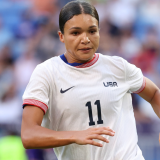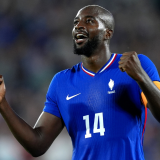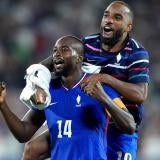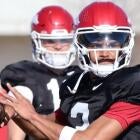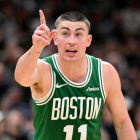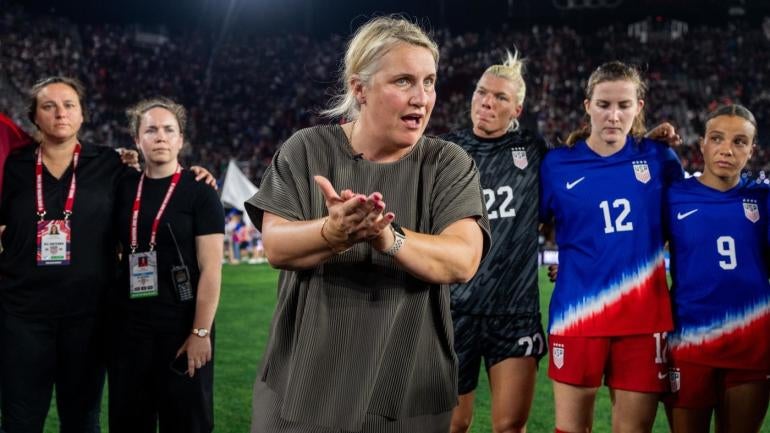
Emma Hayes made the most of a trip to New York in late spring, telling stories about excitedly using expletives upon receiving the U.S. women's national team job, stopping for a photo op with actor Chris Pratt and sneaking in strolls around Central Park in between.
It was hard not to notice the difference 23 years had made. While she was in a bathtub and her sister Rebecca was on the toilet, a 24-year-old Hayes said she needed to go to the center point of women's soccer to advance her career -- the United States. She arrived at John F. Kennedy International Airport with $1,000 and a job with MLS camps, coaching children in the New York City suburbs on Long Island. She did just that, bouncing around the U.S. before becoming the most high-profile person to ever coach a women's soccer team, boasting both the résumé and the salary to back up the claim.
Hayes made a name for herself in her native London, turning Chelsea into one of the best women's soccer teams in the world during her 12-year stint. By her own admission, though, she was " lucky to be born in England but made in America," and feels right at home in her adopted nation. It helps that the U.S. has changed just as much as she has in the last two decades -- the USWNT went from two Women's World Cup wins to four since Hayes landed in New York in 2001, emerging as one of the most relevant sports teams in the U.S. as they coupled their success with the rising tide of women's sports.
"My mum's here with me this week and I think she'd like me to be a bit more homesick," Hayes said before a friendly against Costa Rica in Washington, D.C. last week, "But I love being in America, I really do, and I love everything that comes with it. I'm just embracing coming back to a soccer culture that has developed since my time here, whether that's the quality of the stadiums that feel more European to the atmosphere within stadiums. I've been really, really impressed."
The pedigrees of both Hayes and the USWNT arguably make their union a perfect match, but in equal measure their reputations raise the stakes. Hayes is being tasked with reversing course after the U.S. clinched their earliest-ever exit at the Women's World Cup last year, and as the team slips to their lowest-ever FIFA ranking of fifth as the competition heats up in women's soccer. The new nuances of the women's game still have not changed the expectations for the USWNT -- Hayes' job remains a pass/fail assessment, based almost solely on collecting winners' medals.
Starting from scratch
Kim Wyant, now the head coach of New York University's men's soccer team, was operating a clinic in the summer of 2001 as one of her many responsibilities at the Long Island Lady Riders, a USL W-League club where she also served as the general manager and goalkeeper. Then, she heard a voice over the back of her shoulder.
"[It's] this woman coaching a little kids' team and it immediately caught my attention," she said. "I'm like, 'Who is this person?' She's quite good and there's a really strong voice and she clearly knows what she's doing and so I waited until my session finished and I actually waited until she finished coaching and I just went over and introduced myself to her. That's actually how I met Emma Hayes."
Wyant told Hayes about the Lady Riders, an independently run second-division club that played second fiddle to the New York Power of the Women's United Soccer Association, the first professional women's soccer league in the U.S. that was ushered in by the popularity of the 1999 U.S. Women's World Cup-winning team. Hayes would need to wear many hats at the Lady Riders as a result if she wanted to be the head coach, which included working in community camps, doing some public relations and administrative work. She took the job anyway and made her aspirations clear from the start.
"I believe in producing attractive soccer and strongly believe in training," she said upon being announced as the head coach in November 2001. "I will bring the European philosophy of total soccer to the Lady Riders."
The focus on training was not just a defining aspect of her tenure in Long Island but throughout her career. Wyant said Hayes' ability to organize training and fitness allowed her to work around budgetary limitations with immediate results. Hayes spent just one season with the Lady Riders, leading them to a first-place finish in the 2002 regular season and a spot in the conference finals, winning league coach of the year in the process.
The same was true when she became the women's soccer coach at Iona University in 2003, this time in the New York suburbs in Westchester County. The Gales were the least-funded team in the Metro Atlantic Athletic Conference, a "bottom of the barrel" side, as former player Megan Teixeira described it. It did not stop Hayes from boasting the best record of any coach at Iona to date with 22 wins and a MAAC Coach of the Year award, and she naturally started with the basics to transform the team.
"When she came on board, it was like a breath of fresh air," Teixeira said, who transitioned from playing as a forward to a midfielder under Hayes. "She's not afraid to shake things up. She's not afraid to really evaluate players and move them and to disrupt where they played their entire lives, which is exactly what she ended up starting to do and moving people around just based off of little evaluations."
She also improved the team's fitness routines, particularly after her first season in charge, when the team won just three games -- up from just two the year before.
"It wasn't until she started seeing us that following spring and really coming together, putting in routines for lifting and things like that, which hadn't been incorporated prior to her coming there," Teixeira recalled. "She just really took the whole year approach rather than just the season approach and we worked hard in offseason for her. We'd always think, offseason, we get to hang out. We did but under Emma, you were afraid to hang out. You wanted to perform for her."
The same was true in 2012 when a 35-year-old Hayes finally made her way to Chelsea after a stint as an assistant at Arsenal from 2006 to 2008 and the head coach for the Chicago Red Stars from 2008 to 2010. Like nearly every other team she coached, little was expected of the semi-professional Chelsea when she came on. The women's team was in such dire straits two years before Hayes' arrival that John Terry, the ex-England captain who holds legend status at Chelsea, pitched in to provide crucial funding. It was only so much help -- Hayes had to build the women's team from the ground up. It was not just that they did not have their own training facilities -- they had no balls, no staff, no food and no one to clean their jerseys. Hayes herself was part-time, working at her family's foreign exchange business at the start, as were the players.
"They're either training in the morning or a lot of times in the evening after they've come off of work," Lisa Cole, a veteran women's soccer coach and Hayes' longtime friend said about her visit to Chelsea in the early days of Hayes' tenure. "They're training with construction lights, so the glare from the evening, if you're on this side of the pitch, you could barely see the ball on that side of the pitch because of where it was … [Club leadership] were just, 'Here's some office space, here's a field in the back corner of the Chelsea facility, good luck. We don't want to hear from you too often. Don't make too much noise.'"
As was the case at Iona, Hayes' tenure at Chelsea was a bit of a slow burn. It took her three years to win her first of 16 major trophies there, an FA Cup that was quickly followed up with a WSL title. It was only after they did the double that the club began the process of professionalizing the women's team, a decision that would prove transformational with Hayes at the helm. She managed to prove her point, though, despite the odds being stacked against her.
"In some ways, that was perfect for Emma because she got back there and she's like, 'Let me go create. Let me go make something happen here,'" Cole said. When she got a 'no,' she figured out why was it a no. Usually, that was money so then she just went and found the money from somewhere else."
Hayes the trailblazer
"She can take players and motivate them in very different ways based off emotional intelligence," Teixeira recalled about working with her at Iona. "She knew exactly how to get the best out of every single one of us. What worked for me didn't work for the next person and she figured that out really quick. Her psychology behind how she coaches individuals and teams, she'll motivate in ways but then she'll also challenge you in different ways."
Hayes' communication skills are amongst her most celebrated talents as a coach, especially considering the way she couples them with her embrace of athletes as people. She was using those skills long before psychological testing, as U.S. Soccer described it when they re-hired Gregg Berhalter to lead the USMNT last year, was as popularized in sports as they are now.
"When she was our assistant, we started to do all these psychological things, but way before it was even a thing to do psychology and [checking] how you're feeling, getting behind the mind of a footballer," Lianne Sanderson, a retired England international who played for Hayes at Arsenal and is also a longtime friend, said. "We had paperwork, we had stuff we'd fill out in meetings … We loved it."
It goes both ways with Hayes, too. She's as eager to share details about her own life, ensuring her players see her as both a human and as their coach. It has already allowed her to bond with her U.S. players despite coaching them for the first time just a month ago. USWNT defender Tierna Davidson said Hayes has already been able to strike the balance of being an approachable boss, introducing herself with a presentation about her life.
"I feel like she has done a very good job of personalizing and humanizing herself while also maintaining a level of respect and confidence that obviously someone who's leading a team has to have," Davidson said. "I think that's a really good balance because you naturally want to play for somebody the more that you know them and understand them and you feel more connected with them. It's the same with us and all teammates, but then also still being able to command a room, have the respect and confidence."
Her effective communication skills are accompanied by a self-assuredness that allows her to clearly make her points, varying as they are. It is obvious she can get her soccer ideas across to her players, but she has also done that in different rooms and with a wide variety of audiences to the point that Wyant believes she would make a good politician. At Chelsea, she pushed to increase funding and standards until the women's team became one of the most professional in the sport. That included a big focus on tracking player menstrual cycles as part of their fitness routines and ensuring players had access to special care during their pregnancies. She feels no need to shy away from any topic and embraces her status as one of the more prominent figures in women's soccer, to the point that she dedicated a chapter in her book, "A Completely Different Game," to her experiences with endometriosis and perimenopause.
"I think it's her own personal journey in some ways. Women don't go through life the same way men do," Cole said about what inspires Hayes to cover such topics. "She's always pushed the envelope. 'How can I improve performance? That means I need to know who I'm coaching and if we don't have research and science to back up what we're doing and why we're doing that.' You would never not have video evidence or data to back up how you're putting a lineup out … I think she just took that to another level."
Her impact is felt by other female coaches, too. Hayes coached Chelsea for the majority of her pregnancy with twins during the 2017-18 season before delivering sons Harry and Albie, the latter who was stillborn, in May 2018. Harry, now six, is constantly by her side, sometimes rocking U.S. colors while his mother is on the touchline. Ella Masar, a former player and current coach at the Red Stars who was a rookie during Hayes' first season there, feels Hayes is tackling the stigma women in sports feel about having families while working in a male-dominated industry.
"Emma has paved the way," Masar, a mother of two, said. "She has paved a way for us young women to one, fight for the right of actually being paid to afford a family because definitely in America, that's not the norm; and number two, just to be able to do both because you have this mom guilt and it's still very much a man's world even though it's women's football so my hat's off for Emma for that because she's been doing this."
A big-time coach
"You could be out with Emma at a restaurant anywhere and she will use the salt and pepper to go through tactics," Sanderson said. "She'll literally start pulling around all the sauces -- tomato ketchup, mayonnaise, mustard, everything and be like, 'This is the formation this team played.' … I don't think I've met anybody more obsessed with football than Emma Hayes."
Hayes' passion for the sport is the foundation of her larger-than-life presence, though her roots are modest. Her love for soccer stems from her family, chiefly her father Sid, who she speaks about frequently. He was not just a champion of his daughter, who he believed would change the face of the women's game, but was heavily involved in grassroots soccer in and around Camden, the London borough where Hayes was born and raised. Her earliest soccer memory is watching Tottenham Hotspur win the 1984 UEFA Cup final in a team-branded tracksuit with her father, who was also at the 1999 Women's World Cup final, calling her and encouraging her to come to the U.S. after seeing 90,000 people fill the Rose Bowl.
Her career trajectory, though, is full of stories that make her seem like a coaching prodigy. Hayes was part of Arsenal's first-ever academy class at the age of 11 in 1988, playing as a midfielder despite looking up to players like Glenn Hoddle rivaling club, Tottenham. (After years of having to tamp down her Spurs fandom because of associations with Arsenal and Chelsea, Sanderson believes that "in the back of her mind, she'll be quite happy now she could probably go to a Tottenham game.") An injury prevented a professional playing career but her tactical eye meant coaching was a natural choice, and her success at the Lady Riders and Iona indicated as much.
The same was true for a spell as an assistant to Vic Akers at Arsenal, someone Sanderson describes as a "control freak" after founding the women's team and academy. Akers was technically an employee of the men's team for much of his time leading the women's side, meaning there were many instances he could not be on the touchline. Hayes stepped in instead and made it her own.
"When Emma came in, I remember there was a couple of moments where Vic was trying to make substitutions on the phone," Sanderson said. "Now Emma did that, but there was times where Vic wasn't even able to watch the game and he's saying to Emma … I remember one time, I think this happened, where Emma just turned off her phone, did what she was doing. I think she put our captain in the back line -- Ciara Grant went into the back line, who was a center midfielder, and I remember she said to me, 'I was praying this was going to work,' and it worked, thank God, and we got through."
Her success at Chelsea, though, coincided with the increased attention on women's soccer both in England and around the world. The increased investment in the women's team at Chelsea meant Hayes could model herself as a CEO, overseeing a multilayered operation while still entrusting a large staff with managing some day-to-day aspects, a style of coaching that is similar to Jurgen Klopp. She took to the spotlight easily, generating headlines at a similar rate as Pep Guardiola -- and is unafraid to do so. She name-drops many equals in the men's game in her book, but not just out of fondness -- her rising profile means she counts many of them as contacts including Sir Alex Ferguson, with whom she shared a glass of wine with after her final match in charge of Chelsea.
She is unafraid to ruffle feathers, famously doing so mere months before joining the USWNT after Chelsea lost the Conti Cup final to Arsenal last spring. She accused Arsenal manager Jonas Eidevall of showing "male aggression on the touchline" during a heated but brief exchange with Chelsea's Erin Cuthbert, something she did not apologize for despite the controversy it caused. Though the language probably would not be used by a male counterpart, coaching scuffles are not unheard of in the men's game. Look no further than her former Chelsea colleague Thomas Tuchel, who feuded with then-Tottenham manager Antonio Conte over a handshake in August 2022.
The small details of her public profile means she resembles soccer's most elite managers, each of whom have personality as much as they have tactical intelligence. Hayes happens to be the first of the genre that made their name in the women's game, but do not mistake her ability to deliver a good quote as a tendency to be off-the-cuff.
"Emma's not afraid to be controversial or to throw something out there," Cole said. "She's intentional when she does that. Sometimes people go, 'She's off the cuff.' No. When she does something like that, that is very planned. She's putting it out there because she's put time and effort into [it]."
It makes her uniquely fascinating compared to the male counterparts she has earned the right to be compared to, perhaps because she is the only one in that group who has had to advocate for herself and her players against systemic inequities. Even outside of that, though, Hayes is an intellectual, weaving in references to Elon Musk and Victorian England in her book, mixing in pictures of pieces in the Tate Modern in motivational talks with her players and quoting the poet Robert Frost in press conferences. Coupled with her stellar résumé, she feels like a one-of-a-kind coach -- though she insists she alone can fix anything, regardless of her reputation.
"What I'm not is a unicorn," Hayes writes in the first chapter of her book. "The concept of a head coach or leader as this magical creature, able to solve any problem for their team or company, is unrealistic and ultimately unproductive. If I have a strength, it is in recognizing and repurposing weakness. We've got to kill the unicorn, challenge the perception of a leader's perfection. It's a modern media myth, designed to create a narrative around successful teams and organizations. If you believe the secret of leadership is as simple as relying on one god or goddess, give my love to the fairies at the end of your garden. Organizations outlive leaders, as long as the right framework is in place."
Time for a re-do
"I think it's an anomaly really," 1999 Women's World Cup winner Brianna Scurry said about the USWNT's long-lasting success. "When you think about sports teams over time, usually the chain breaks somewhere with some generation of players on that team for that time but this team has won a championship every cycle and no one else has done that before."
Hayes shares a passion for winning and a history of blazing a trail with her new team, perhaps making her and her players more similar than not. Even then, though, the USWNT are in some ways an anomaly for Hayes -- she has never walked into a team with as storied a pedigree as the four-time world champions, and where the expectations are as high as they are here. There is one experience that offers some similarities, though -- her short stint at the Chicago Red Stars, the only team that has ever fired Hayes.
The Red Stars hired a 32-year-old Hayes after her stint at Arsenal, their first in the WPS, the second professional women's soccer league in the country. She assembled an all-star squad fairly quickly -- University of Portland talent Megan Rapinoe was her first draft pick in 2009, while future legends of the game Carli Lloyd, Cristiane, Karen Carney and Caroline Jonnson were on the roster.
"The team that she could assemble back then at the Red Stars was probably the best team I've ever played for," Masar, a rookie on that 2009 team, said. "I think she is one of the best people, again, at getting people in the room to believe in the project because that's what she did at Chicago. She could get all these people from literally Australia, Sweden, Brazil, America, the top players to come in. We just never took that final step."
The Red Stars won just five games that season and then just once before she was fired by then-chairperson Marcia McDermott, who sent Hayes into a frenzy when she requested a meeting one day that Hayes dropped her phone in the toilet. As Hayes recalls in her book, she was fired in a Starbucks and then made her way to a nearby Dunkin' waiting for Denise Reddy -- her assistant at the Red Stars, Chelsea and now the U.S. -- to give her a ride.
Her last job in the U.S. ended on such a disappointing note that Hayes claimed she would never return to the game.
"I think she felt wronged a little bit by the game in some ways," Cole, then an assistant to Tony DiCicco at the Boston Breakers, said. "She was hired because she was good and she was young and creative and all these things and just because things didn't blossom quickly enough for that team at that time, then she's out. … She just felt a bit unfair and she was a bit like, 'Why am I doing this?' At that time in the game, you're not making a lot of money. You're making a lot of sacrifices to coach the game and so I think at that time, she's like, 'Why am I doing this? Putting everything into this and not getting a lot back,' at that time but I think most of us knew she would come back eventually because the game is in her."
It is not the only unfinished business she has in the U.S., either. Some might perceive Hayes to be the one fix the U.S. needed, but well before she insisted she was not a unicorn in her book, Hayes noticed the structural problems in the U.S. soccer system. Cole pointed to their first time working together as college coaches for the Olympic Development Program, where the best young players were identified in different regions of the country and then trained.
"I was in charge of goalkeeping," Cole said. "I would, a lot of time, walk around make sure the goalkeepers were not just standing to the side and so I remember then before we'd even really officially met, being like, 'Oh, she's talented. You know when you recognize somebody who has high energy, players were having fun, she got the goalkeepers I sent over engaged right away. I remember us having a conversation that I could bring them over earlier if I wanted, which never happened. Usually, the field player-coaches were like, 'Can you keep them the whole time? We don't even want to see them until they're shooting on goal,' and then they wanted them."
Cole said she and Hayes also stood out from the other coaches in the program because of her tactical vision.
"We had good fights and discussions," Cole said. "I always thought that one thing we do in the U.S. a lot is we identify talent from a physical standpoint and so a lot of times, we would end up on the same side because we'd be like, 'Look, this kid's smaller or this kid's maybe not quite as fast or athletic or whatever but look at her skill. Her skill is incredible.' Especially at those younger ages, we can't keep selecting players that are just athletes. We need to also take care of those players that are talented. It's the same discussion we're having today in the U.S., to be honest."
It is perhaps why Hayes continues to stress patience as she takes charge of the USWNT. Captain Lindsey Horan may have eyed a gold medal in her post-match remarks in the U.S. send-off game last week, but Hayes has publicly avoided any such target. She talks constantly about a layered approach, saying she has much to teach her team before they play the way she wants them to. She offers a dose of realism in her assessment of the team, unafraid to do a public audit of the USWNT as someone who is inheriting their problems. She has politely been critical of her predecessors' refusal to give meaningful game time to young players and has already admitted the team is not perfect, though she did offer an optimistic spin on things.
"If we went into Zambia perfect, I'd be worried," she said after a 0-0 draw against Costa Rica last week. "I feel the opposite. I think we've had in the Korea game, the Mexico game, the Costa Rica game, four very different exercises. One, as I said earlier, breaking down a mid-block. Two, breaking down an aggressive mid-block. Three, breaking down a team that beat us in the Gold Cup with more man-for-man marking. Four, breaking down a low, low block."
Her comments reflect another one of her beliefs, that the U.S. team has not done a good enough job diversifying their tactical profile and finding a way to beat a variety of teams.
"It would have been a really difficult job to [turn] down because whatever coach that's ever been a part of anything in the U.S., it's the biggest job, Cole said. "It's the biggest job in a moment where it's not going to be easy to win. We're going to have to work to get us back on the pedestal and I think that's why it made it even more exciting for Emma because it's not just about can we maintain the status quo that the U.S. has? No, we need to get our shit together. We need to rethink what we're doing, reframe it and if we want to be the best in the world, we need to get back to the top in every little thing."
![[object Object] Logo](https://sportshub.cbsistatic.com/i/2020/04/22/e9ceb731-8b3f-4c60-98fe-090ab66a2997/screen-shot-2020-04-22-at-11-04-56-am.png)

